Sunday 28 March 2021
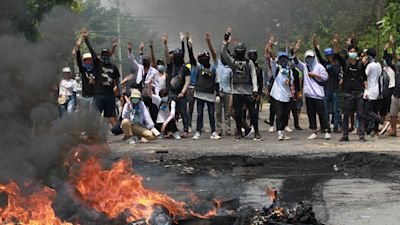
Video report by ITV News Reporter Graham Stothard
A record number of civilians, including children, have been killed in the deadliest day since Myanmar's military coup last month.
An independent researcher in the city of Yangon put the death toll at 107, with the bloodshed having spread over more than two dozen cities and towns.Security forces in the south-east Asian nation have been accused of opening fire on armed civilians, killing dozens of innocent people, including children, in a bloody crackdown on the annual armed forces day
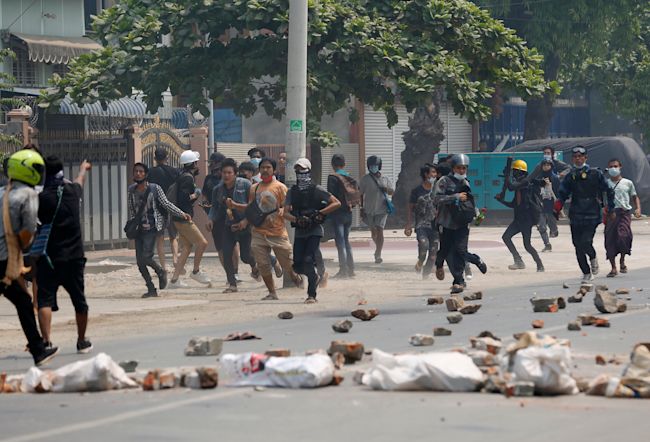
Saturday's death toll surpasses estimates for the previous high on March 14, which ranged from 74 to 90 deaths.
As of Friday, the number of protesters killed since the takeover was 328, said the Assistance Association for Political Prisoners, which documents deaths and arrests. This figure does not take into account the deaths which took place on Saturday.
It said its tally only includes verified cases, with the actual number of casualties “likely much higher.” It said eight people were killed on Friday.
CCTV footage from the city of Dawei showed security forces opening fire at point-blank range on three men who rode past their pick-up truck on a motorbike.
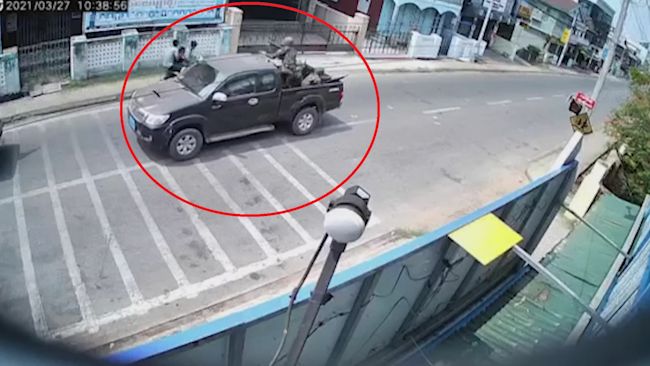
Footage showed the bike crashing into a gate and two of the men running off under renewed fire from what appeared to be police officers.
The third man could be seen falling on the ground after being hit, then carried onto one of the security vehicles
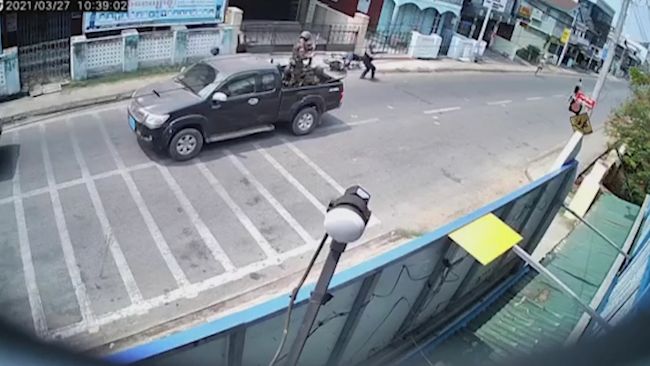
It was later confirmed the third man survived and was being treated in hospital.
Myanmar security forces met renewed anti-coup protests with unsparing violence on Saturday, firing live rounds into crowds across the country and killing scores of people in more than two dozen towns and cities.
While the military celebrated the annual holiday with a parade in the country’s capital, Naypyitaw, people across Myanmar called for bigger demonstrations.
The protesters refer to the holiday by its original name, Resistance Day, which marks the beginning of a revolt against Japanese occupation in World War 2.
In the small town of Launglone, around 3,000 anti-coup protesters took to the streets with no interference from security forces.
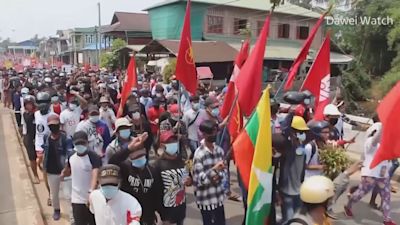
It was a rare peaceful demonstration on a day when police and soldiers brutally suppressed opposition to last month's takeover, firing into crowds and killing dozens across the country.
The head of the military Min Aung Hlaing used the country's Armed Forces Day to try to justify the overthrow of Aung San Suu Kyi's elected government on February 1.
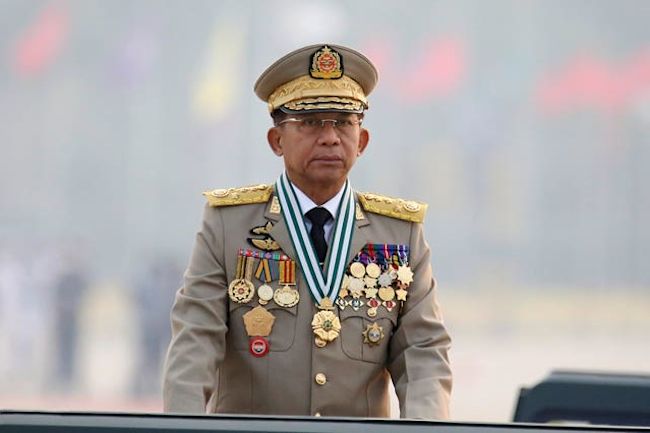
In a televised speech before thousands of soldiers at a massive parade ground at the capital Naypyitaw on Saturday, Senior General Min Aung Hlaing referred to “terrorism which can be harmful to state tranquility and social security,” and called it unacceptable.
In his speech, Min Aung Hlaing accused Ms Suu Kyi’s government of failing to investigate irregularities in the last polls, which her National League for Democracy party won in a landslide.
He said his government would hold “a free and fair election”.

Foreign Secretary Dominic Raab said the regime had hit a “new low” on Saturday.
“Today’s killing of unarmed civilians, including children, marks a new low," Mr Raab said.
“We will work with our international partners to end this senseless violence, hold those responsible to account, and secure a path back to democracy.”
The slaughter has provoked an international outcry, with the British ambassador among the diplomatic missions raising concerns that children are among the dead.
Dan Chugg, the British ambassador in Yangon, said that the “security forces have disgraced themselves by shooting unarmed civilians”.
“At a time of economic crisis, Covid and a worsening humanitarian situation, today’s military parade and extrajudicial killings speak volumes for the priorities of the military junta,” he said.
The European Union’s delegation to Myanmar said on Twitter: “This 76th Myanmar armed forces day will stay engraved as a day of terror and dishonour. The killing of unarmed civilians, including children, are indefensible acts.”
State television MRTV on Friday night showed an announcement urging young people to learn a lesson from those killed already about the danger of being shot in the head or back.
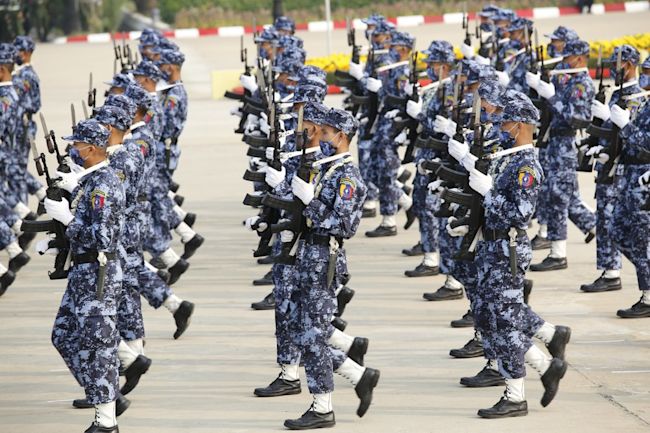
The warning was taken as a threat because many protesters have been shot in the head, suggesting they were deliberately killed.
The announcement suggested some young people were taking part in protesting as if it was a game, and urged their parents and friends to advise them not to participate.
The junta detained Ms Suu Kyi on the day of the takeover. It continues to hold her on minor criminal charges while investigating allegations of corruption against her that her supporters dismiss as politically motivated.
Myanmar police officers flee to India after claiming they were ordered to shoot protesters
At least four shot dead after Myanmar civilian leader vows ‘revolution’ against junta
CCTV captures Myanmar security forces firing at point-blank range on passing motorcyclists
Myanmar protests continue after more than 100 killed in bloodiest day since coup
Sunday 28 March 2021,
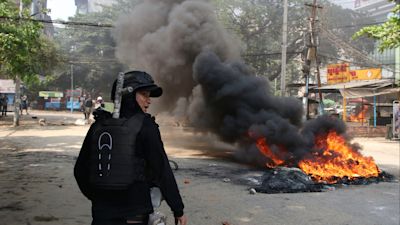
Video report by ITV News Senior Correspondent Paul Davies
Protesters returned to the streets of Myanmar on Sunday to press their demands for a return to democracy, just a day after security forces killed more than 100 people in the bloodiest day since last month’s military coup.
Demonstrations were held in Yangon and Mandalay, the country’s two biggest cities, as well as elsewhere. Some protests were again met with police force.
At least 114 people were killed on Saturday as security forces cracked down on protests against the February 1 coup which ousted Aung San Suu Kyi’s elected government, according to the online news service Myanmar Now.
Several children under 16 were reported to be among the dead.
Similar death tolls were issued by other Myanmar media and researchers, far exceeding the previous highest on March 14.
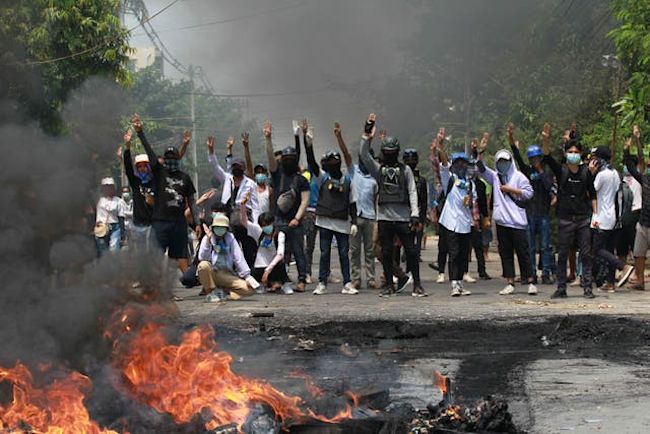
The number of killings since the coup is now more than 420, according to multiple counts.
The coup reversed years of progress towards democracy after five decades of military rule and has again made Myanmar the focus of international scrutiny.
Saturday’s killings by police and soldiers took place throughout the country as Myanmar’s military celebrated the annual Armed Forces Day holiday with a parade in the country’s capital, Naypyitaw.
CCTV captures Myanmar security forces firing at point-blank range on passing motorcyclists
The bloodshed quickly drew international condemnation, both from diplomatic missions within Myanmar and from abroad.
UN Secretary-General Antonio Guterres said he was shocked by the killings of civilians, including children.
“The continuing military crackdown is unacceptable and demands a firm, unified & resolute international response,” he wrote on Twitter.
In the United States, Secretary of State Antony Blinken said in a tweet that his country is “horrified by the bloodshed perpetrated by Burmese security forces, showing that the junta will sacrifice the lives of the people to serve the few”.
The military chiefs of 12 nations issued a joint statement condemning the use of force against unarmed people.
“A professional military follows international standards for conduct and is responsible for protecting – not harming – the people it serves,” it said.
“We urge the Myanmar armed forces to cease violence and work to restore respect and credibility with the people of Myanmar that it has lost through its actions.”
The statement was issued by the defence chiefs of Australia, Canada, Germany, Greece, Italy, Japan, Denmark, the Netherlands, New Zealand, South Korea, the United Kingdom and the United States.
Human rights group Amnesty International revived criticism that the international community is not doing enough to end the state violence in Myanmar.
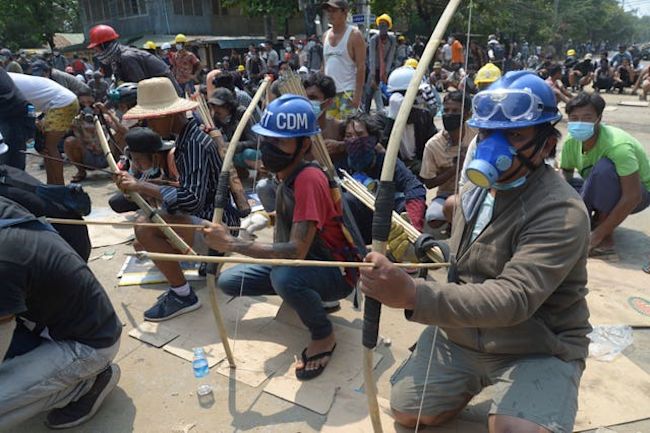
“UN Security Council member states’ continued refusal to meaningfully act against this never-ending horror is contemptible,” said Ming Yu Hah, the organisation’s deputy regional director for campaigns.
The Security Council has condemned the violence but not advocated concerted action against the junta, such as a ban on selling it arms.
China and Russia are both major arms suppliers to Myanmar’s military as well as politically sympathetic, and, as members of the council, would almost certainly veto any such move.
In recent days the junta has portrayed the demonstrators as the ones perpetrating violence for their sporadic use of Molotov cocktails.
On Saturday, some protesters in Yangon were seen carrying bows and arrows.
The junta has said its use of force is justified to stop what it has called rioting.







